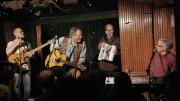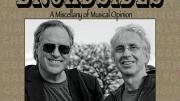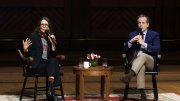The musical guns are blasting on Broadsides: A Miscellany of Musical Opinion, the new CD from singer-songwriters John Forster ’69 and Tom Chapin. In ragtime, rock, and reggae, the pair explore a gamut of social ills, from the specter of a “Zombie Bank” to the outsourcing of wars to private corporations (“Total Security Solutions, Inc.”) to white-collar crime, in “The Chief Executive Chain Gang.”
The album began in 1999, when National Public Radio (NPR) invited Forster, an accomplished songwriter and shrewd satirist, and Chapin, a singer known for his music for kids, to submit songs to accompany segments of NPR’s “Morning Edition” news program. The radio network laid down two strict guidelines: the songs couldn’t be partisan or one-sided, and there had to be a news hook. (The latter was a given, but to a satirist, the former is a tight rein indeed.) “After we wrote the first few songs,” Forster says, “we realized that the invitation provided us an opportunity to create a very rare kind of album, one composed entirely of topical songs.” They went on to write dozens, 14 of which are on Broadsides.
The new CD, Forster and Chapin’s first collaboration for adults (they have recorded 10 children’s CDs), follows a tradition of populist storytelling and commentary that dates back to sixteenth-century England, where such ballads, printed on single-sided long sheets called “broadsides,” took root. These songs were played and sung in public. “Some were romantic,” says Forster, “but many were satirical or just plain critical, reaming anyone from the hat-checker to the king.”
Their twentieth-century equivalents are protest songs from folk masters like Woody Guthrie and Pete Seeger ’40, and later Phil Ochs, Tom Paxton, and others who served as paradigms for Forster and Chapin. The CD’s eponymous opening number salutes these artists and the broadside form itself, calling it “A tough, melodic weapon/Packed with values we affirm.” Another muse is legendary satirist-songwriter Tom Lehrer ’47, A.M. ’47. “What Lehrer was doing, and what we’ve done here,” says Forster, “is what I call, ‘op-ed pieces with key signatures.’ ”
The two men sought subjects that were timely but not ephemeral. “You try to get some perspective,” Forster says, “and write something big enough that it won’t be out of date a year from now.” Consider the track “Econo-Me-Oh-My,” a wry take on the business cycle, with spoken asides, which the songwriters presented to their NPR editor while the economy was thriving. “She told us to hang on to it, and about six months later, AT&T announced they’d laid off 10,000 people,” Forster says. “We called her and said, ‘Remember that song?’ And it aired the next day.”
In a career that encompasses humor, children’s music, and theater, with Grammy nominations and compositions recorded by artists ranging from Faith Hill to Judy Collins to Mary-Kate and Ashley Olsen, Forster remains hooked on songwriting. “A song is an amazing thing,” he says. “By combining an idea with the emotion of music, you can feel a thought. It’s a magical process.”
But can it make a difference? Though Broadsides will keep listeners chuckling and mulling, Forster and Chapin hope for more. “When you write topical stuff,” says Forster, “you always come across that underlying question: can a song change the world? Yeah, right. There’s a problem in Rwanda--we’ll write a song about it and everything will be great. No! But what part did ‘La Marseillaise’ play in the French Revolution? And think about ‘We Shall Overcome.’”
In the track “Broadside,” Forster and Chapin toast that song: “‘We Shall Overcome’ finally overcame,” they write, “’cause everybody sang along.” Forster explains: “The song became a component of the zeitgeist. It really can happen.”









